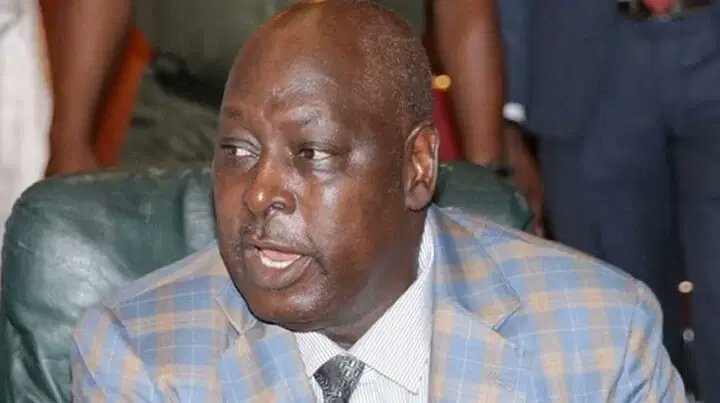Nigeria’s President Bola Ahmed Tinubu attended the inauguration of Pope Leo XIV at the Vatican, a historic event that marked the first time a Nigerian president has attended a papal inauguration. The visit, intended as a gesture of interfaith diplomacy, sparked a firestorm of debate back home, with former Secretary to the Government of the Federation, Babachir Lawal, calling it “an insult to Christianity.” This polarizing statement has reignited discussions about Nigeria’s delicate religious balance, the implications of the Muslim-Muslim ticket, and the role of leadership in fostering unity.
Tinubu’s Vatican Visit
President Tinubu, a Muslim, led a delegation that included prominent Christian figures such as Vice President Kashim Shettima’s wife, Hajia Nana Shettima, and other Christian dignitaries to the Vatican for the inauguration of Pope Leo XIV. The visit was framed by Tinubu’s administration as a demonstration of Nigeria’s commitment to global interfaith dialogue and religious tolerance. During a dinner with Cardinal Pietro Parolin, the Vatican’s Secretary of State, Tinubu emphasized Nigeria’s dedication to fostering cooperation across religious lines, both domestically and internationally.
The trip was historic for several reasons. No Nigerian president had previously attended a papal inauguration, making Tinubu’s presence a significant diplomatic gesture. Nigeria, a country of roughly equal Christian and Muslim populations, often navigates complex religious dynamics in its governance. Tinubu’s decision to personally attend the event, rather than delegate it to a Christian representative, was seen by his supporters as a bold move to bridge divides and project Nigeria as a unified, inclusive nation on the global stage.
Babachir Lawal’s Critique
Babachir Lawal, a prominent Christian and former Secretary to the Government of the Federation under President Muhammadu Buhari, did not mince words in his condemnation of Tinubu’s Vatican visit. In a widely circulated statement, Lawal described the trip as “an insult to Christianity,” arguing that it underscored the marginalization of Christians under Tinubu’s administration. His criticism is rooted in his long-standing opposition to the All Progressives Congress (APC)’s Muslim-Muslim ticket, which saw Tinubu, a Muslim, paired with Vice President Kashim Shettima, also a Muslim, during the 2023 presidential election.
Lawal’s argument hinges on representation. He contends that a Christian vice president or another high-ranking Christian official should have represented Nigeria at the papal inauguration, given the event’s significance to the global Christian community. He dismissed the visit as a non-achievement, suggesting it was likely secured through lobbying rather than genuine diplomatic merit. For Lawal, the optics of a Muslim president leading a delegation to the Vatican reinforce his belief that the Muslim-Muslim ticket sidelines Christians in Nigeria’s political landscape.
Lawal’s remarks are not new. Since the APC announced its ticket in 2022, he has been a vocal critic, arguing that it disregards Nigeria’s religious diversity and risks alienating half of the population. His latest comments have added fuel to an ongoing debate about whether Tinubu’s administration adequately represents Christians, particularly in a country where religious identity often shapes political perceptions.
Nigeria’s Religious Dynamics
To fully understand the controversy, it’s essential to consider Nigeria’s complex religious landscape. Nigeria is roughly split between Christians, predominantly in the south, and Muslims, primarily in the north, with each group making up about half of the population of over 230 million. Religion plays a significant role in politics, and leaders are often scrutinized for how they balance representation between the two faiths.
The Muslim-Muslim ticket of Tinubu and Shettima was a contentious issue during the 2023 election. Supporters argued that competence, not religion, should determine leadership, and Tinubu’s track record as Lagos State governor demonstrated his ability to govern inclusively. Critics, like Lawal, countered that the ticket risks alienating Christians and undermining Nigeria’s delicate religious balance. The debate over the ticket has lingered into Tinubu’s presidency, with every major decision viewed through the lens of religious representation.
Tinubu’s Vatican visit, therefore, is not just a diplomatic event but a lightning rod for these broader tensions. For critics like Lawal, it symbolizes a missed opportunity to affirm Christian representation. For supporters, it’s a bold statement of unity, showing that a Muslim president can engage with Christian institutions on a global stage without prejudice.
The controversy over Tinubu’s Vatican visit raises several critical questions about leadership, representation, and diplomacy in Nigeria:
-
Representation vs. Competence: Lawal’s argument centers on the need for symbolic representation, suggesting that a Christian leader should have attended the papal inauguration. However, Tinubu’s supporters argue that competence and intent matter more than religious identity. In a diverse country like Nigeria, how should leaders balance symbolic gestures with practical governance?
-
Interfaith Diplomacy: Tinubu’s visit aligns with his administration’s stated goal of promoting interfaith dialogue. By attending the papal inauguration, he positioned Nigeria as a nation committed to global cooperation. But does this gesture resonate with Nigerians, or does it feel like a performative act, as Lawal suggests?
-
Political Polarization: Lawal’s comments reflect a broader trend of polarization in Nigerian politics, where religious identity often overshadows policy discussions. The Muslim-Muslim ticket remains a divisive issue, and Tinubu’s actions are unlikely to satisfy all sides. How can leaders bridge these divides without alienating key constituencies?
-
Global Perception: On the international stage, Tinubu’s visit was a diplomatic win, strengthening Nigeria’s ties with the Vatican and showcasing its role in global interfaith efforts. However, domestic backlash risks overshadowing these gains. Can Nigeria leverage such opportunities without fueling internal discord?
Join our Whatsapp channel to stay updated always!


